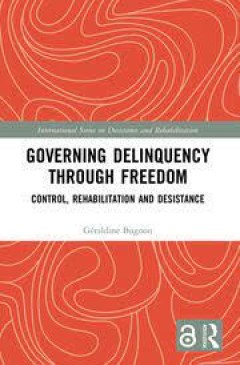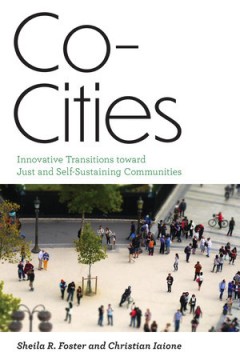Filter by

APCC Special Report: Strukturen für ein klimafreundliches Leben
Die Klimakrise betrifft uns alle - Doch wie kann ein klimafreundliches Leben für alle erreicht werden? Zahlreiche wissenschaftliche Sachstandsberichte bestätigen schon lange den umfassenden Handlungsbedarf, um die Klimaziele zu erreichen. Dieser betrifft alle Lebensbereiche: von Arbeit und Pflege über Wohnen bis zu Mobilität, Ernährung und Freizeit. Doch wie verwirklicht man solch eine …
- Edition
- 1
- ISBN/ISSN
- 978-3-662-66497-1
- Collation
- XX, 715
- Series Title
- -
- Call Number
- -

The Forum of Federations Handbook on Local Government in Federal Systems
This book brings together leading scholars and practitioners from around the globe to examine the current roles of and future trends in local government structures and mechanisms in 16 different federal and federal-type countries. In doing so, this volume explores pressing topics such as the institutions of local government, constitutional recognition, financial management, intergovernmental re…
- Edition
- -
- ISBN/ISSN
- 9783031412820
- Collation
- -
- Series Title
- -
- Call Number
- -

Taking the EU to Court
This open access book provides an exhaustive picture of the role that annulment conflicts play in the EU multilevel system. Based on a rich dataset of annulment actions since the 1960s and a number of in-depth case studies, it explores the political dimension of annulment litigation, which has become an increasingly relevant judicial tool in the struggle over policy content and decision-making …
- Edition
- 1
- ISBN/ISSN
- 978-3-030-21629-0
- Collation
- -
- Series Title
- Palgrave Studies in European Union Politics
- Call Number
- XXI, 239

Governing Delinquency Through Freedom : Control, Rehabilitation and Desistance
"This book analyses the non-custodial government of young offenders in two major cities in Brazil. In doing so, it delves into the paradox of an institution exerting control over youths while at the same time promoting their autonomy and responsibility. The study sheds light on the specific logics of power, control, and inequality produced by such institutional settings. The book’s analysis i…
- Edition
- -
- ISBN/ISSN
- 9780429466175
- Collation
- -
- Series Title
- -
- Call Number
- -

Citizen Participation in the Information Society
This open access book examines how digital technologies are used to promote citizen participation in democratic urban development. It assesses the emergence, use, applicability and functions of digital modes of citizen participation in multiple cities around the world, where political regimes invite ordinary citizens to partake in policy processes through information technologies. The book also…
- Edition
- 1
- ISBN/ISSN
- 978-3-030-99940-7
- Collation
- -
- Series Title
- -
- Call Number
- XIII, 196

Co-Cities: innovative transitions toward just and self-sustaining communities
"A new framework for experimental and innovative "city-making" for urban resources and services to be developed and governed in a collaborative, socially, and economically inclusive ways"--OCLC-licensed vendor bibliographic record.
- Edition
- -
- ISBN/ISSN
- 9780262369930
- Collation
- 1 online resource.
- Series Title
- -
- Call Number
- -

The anthropology of parliaments : entanglements in democratic politics
- Edition
- -
- ISBN/ISSN
- 9781003084488
- Collation
- -
- Series Title
- -
- Call Number
- -
- Edition
- -
- ISBN/ISSN
- 9781003084488
- Collation
- -
- Series Title
- -
- Call Number
- -

Emerging practices in intergovernmental functional assignment
- Edition
- -
- ISBN/ISSN
- 9781315620947
- Collation
- -
- Series Title
- -
- Call Number
- -
- Edition
- -
- ISBN/ISSN
- 9781315620947
- Collation
- -
- Series Title
- -
- Call Number
- -

Fragility, Aid, and State-building: Understanding Diverse Trajectories
Fragile states pose major development and security challenges. Considerable international resources are therefore devoted to state-building and institutional strengthening in fragile states, with generally mixed results. This volume explores how unpacking the concept of fragility and studying its dimensions and forms can help to build policy-relevant understandings of how states become more res…
- Edition
- -
- ISBN/ISSN
- 9781315115344
- Collation
- -
- Series Title
- -
- Call Number
- -

State-sponsored disinformation around the globe: how politicians deceive thei…
Introduction : deceiving from the top : state-sponsored disinformation as a contemporary global phenomenon / Martin Echeverría and Sara García Santamaría -- Theoretical understanding of state-sponsored disinformation / Petros Iosifidis -- Rethinking disinformation for the global South : towards a particular research agenda / Grisel Salazar Rebolledo -- Statistics and state-sponsored disin…
- Edition
- -
- ISBN/ISSN
- 9781032632940
- Collation
- -
- Series Title
- -
- Call Number
- -
 Computer Science, Information & General Works
Computer Science, Information & General Works  Philosophy & Psychology
Philosophy & Psychology  Religion
Religion  Social Sciences
Social Sciences  Language
Language  Pure Science
Pure Science  Applied Sciences
Applied Sciences  Art & Recreation
Art & Recreation  Literature
Literature  History & Geography
History & Geography